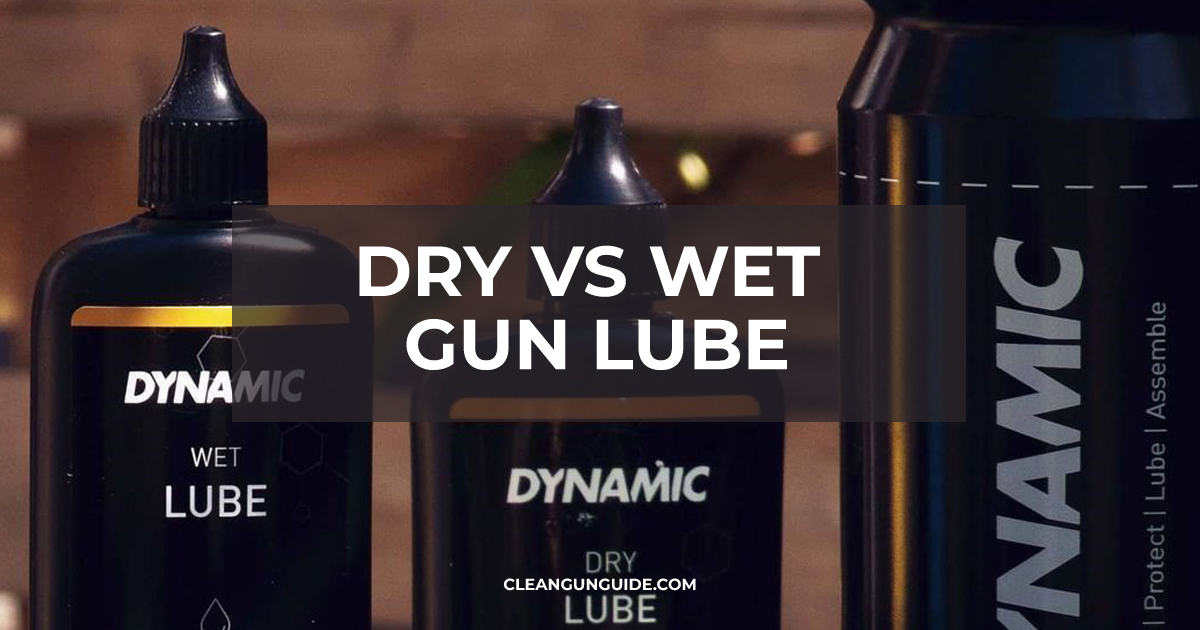
Finding a good lubricant for your gun is essential, and the most commonly used are wet lubes, but more gun owners are starting to use dry lubes.
In any case, you need to keep your firearm in good working condition always, ready to use when necessary. More importantly, if it is a carry gun, which you use for personal defense. Therefore, it is essential to find good-quality gun lube.
The difference between dry gun lube and wet gun lube

The main difference between a dry gun lube and a wet one is that a dry gun lube is usually in a solid state and does not contain any oil. Some dry lubes come in powder form, and others in a liquid form which turns solid upon application. Some good examples of dry lubes include Teflon, Molybdenum disulfide, and graphite.
Graphite works wells to minimize friction and wear; however, it can cause corrosion in aluminum and steel. Teflon is a good lubricant, but it only works well in certain conditions. Molybdenum disulfide or moly is also a good lubricant that stays in place, but it forms acids when it comes into contact with water.
A wet gun lube, on the other hand, is an oil. It can either be a petroleum-based oil or a synthetic oil. Wet lubes are usually blended with different additives to enhance their capabilities. This is why you find that many wet gun lubes effectively remove carbon fouling, dirt, and grime and protect a gun’s metallic parts from rust and corrosion.
Many of them function as cleaners, lubricants, and protectants. Besides that, they stay in place after application to provide a firearm with long-term protection against the effects of use and extend its life.

Generally speaking, both dry and wet gun lubes do a good job of reducing friction and heat, which tends to increase wear. However, dry lubes are ideal for short-term protection against friction. But they do nothing to protect against rust and corrosion.
Wet lubes, on the other hand, reduce friction and provide long-term protection against rust and corrosion. That said, which lube would be the best to use?
It all depends on how frequently or infrequently you use your gun.
The more you use your firearm, the dirtier it will get. Wet lubes are formulated to stay in place, and although they don’t attract dirt, they do hold dirt. That means that dirt sticks to them.
This is not the same with dry lubes because they don’t hold dirt since they dry up quickly. And this is one significant advantage dry gun lubes have over wet lubes. So, if you shoot your gun frequently, a dry lube will come in handy for smooth shooting and keeping your gun clean.

But on the other hand, choosing to use dry lube to lubricate your gun is not a good idea. That’s because dry lubes are simply not suitable lubricants for long-term protection. Using a dry lube on a gun, you intend to put in storage would be a big mistake because the lube will do nothing to protect your firearm against rust and corrosion.
While if you use a wet lube to lube your gun before storage, it will provide adequate protection against corrosion for a long time. So although dry lubes will keep your gun clean and reduce friction, they will not help protect it against corrosion.
In short, choosing which type of lube to use on your gun largely depends on how frequently you use it and how clean you want it to be after shooting rounds.
Each lube has its pros and cons, and ultimately, you have to pick the lube that suits your situation. The best advice is to get both. These gun lubes don’t cost much. You can use a dry lube when shooting rounds and a wet lube to protect your firearm from the effects of moisture.


